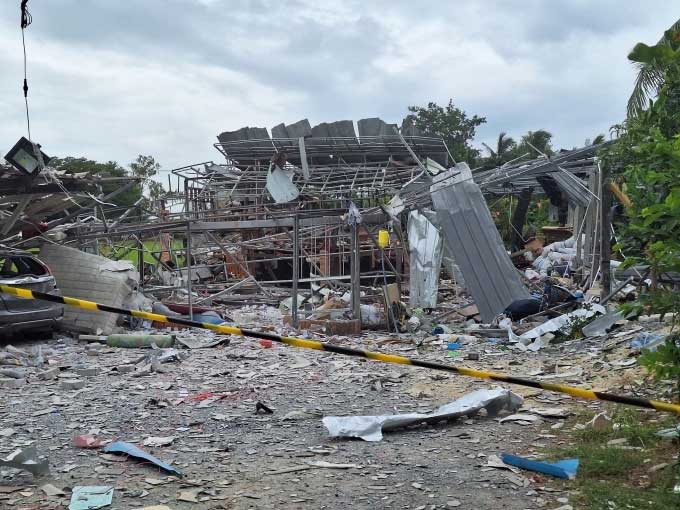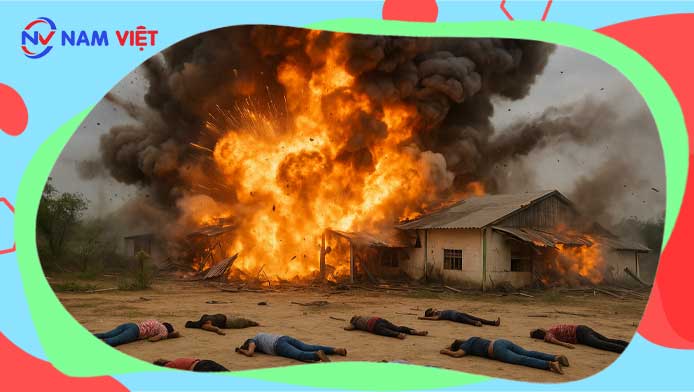Story about labor safety
Fireworks factory explosion in Thailand leaves 9 dead
The explosion at a fireworks factory in Thailand on July 30, 2025, caused a tragedy with at least 9 deaths and many injured. This event not only raised concerns about occupational safety in the fireworks manufacturing industry but also clearly reflected shortcomings in the enforcement of safety regulations in this country. This article will delve into the causes, consequences, and necessary solutions to improve occupational safety to prevent similar disasters in the future.
1. Summary of the fireworks factory explosion in Thailand
On July 30, 2025, a major explosion occurred at a fireworks factory in Mueang District, Suphan Buri Province, central Thailand. The explosion caused at least 9 deaths and many injuries. The factory was reportedly operating illegally, while toxic fumes from the explosion spread to neighboring areas, raising concerns among local residents. Photos from the scene showed scattered production materials and the complete destruction of the factory.
2. Main causes of the explosion and investigation
The Explosive Ordnance Disposal (EOD) agency of Thailand has begun investigating the cause of the explosion. According to information, the factory was converted from two residential houses and specialized in producing small-sized fireworks for farmers. Officials stated there were no warning signs before the explosion. The investigation is expected to focus on the production process, occupational safety, and violations of safety regulations at this factory.

3. Consequences of the explosion for residents and community
The explosion not only caused casualties — specifically 9 deaths and many injured — but also resulted in serious damage to surrounding property. Local residents experienced chaos and anxiety about the potential for similar explosions in the future. Emergency response efforts became necessary as people worried about community safety.
4. Current occupational safety regulations in Thailand
Thailand still faces challenges in enforcing occupational safety regulations. Although regulations exist, practical application is often insufficient. This situation causes many factories, such as the recent fireworks factory, to face high risks and frequent occupational accidents. Local authorities need to intensify education and awareness campaigns about occupational safety for businesses to reduce risks for workers.
5. Role of the Explosive Ordnance Disposal (EOD) agency in safety management
EOD plays a critical role in managing and controlling activities related to explosives in Thailand. The agency is responsible for conducting periodic inspections and ensuring that businesses involved in explosive materials manufacture and processing comply with safety regulations. Following the recent explosion, EOD has pledged to strengthen monitoring to prevent illegal factories from operating.
6. Comparison of the explosion with previous occupational accidents in Thailand
Over the years, Thailand has witnessed numerous explosions and occupational accidents at fireworks factories. Each incident has resulted in severe consequences for victims and their families, with a common denominator being failures in occupational safety management. The recent fireworks factory explosion mirrors past incidents, revealing persistent gaps in enforcement and supervision of safety regulations.
7. Solutions to improve occupational safety in the fireworks manufacturing industry
To improve occupational safety in the fireworks sector, businesses need to implement several key measures:
- Enhance education and training on occupational safety for employees.
- Fully implement quality inspection and supervision procedures during production.
- Improve working conditions and provide adequate safety equipment for workers.
- Closely cooperate with regulatory agencies like EOD to comply with safety standards.
8. Recommendations for businesses and workers to minimize future risks
Not only businesses but also workers must proactively identify and report potential hazards by:
- Promptly reporting incidents and ensuring adequate personal protective equipment.
- Participating in training on emergency response skills and occupational safety.
- Promoting a culture of cooperation to build a safe working environment.
At this critical time, Thai authorities must seriously review and reform occupational safety regulations to protect workers’ health and lives. Raising awareness and responsibility will not only optimize business benefits but also reduce the negative impacts of occupational accidents.

